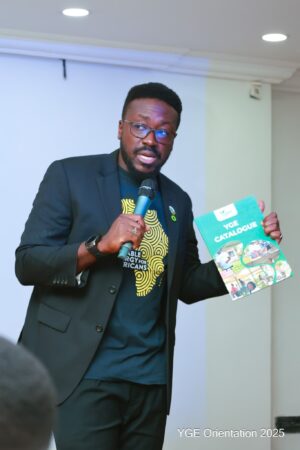By Juliet ETEFE ([email protected])
Young innovators have been urged to deepen their understanding of sustainability, discipline, and financial viability to succeed in the green economy.
This consensus was reached at the orientation of the third cohort of the Young Green Entrepreneurs (YGE) programme.
As the world transitions toward a more sustainable future, the YGE programme by Strategic Youth Network for Development (SYND) forms part of effort to equip young entrepreneurs to lead charge in the growing green and circular economy — a sector estimated at over US$200 billion globally.
The orientation brought together stakeholders and mentors in green enterprise, providing insights, tools, and strategies to equip the next generation of climate-conscious entrepreneurs.

Project Lead for the YGE Initiative, Maxwell Beganim noted that the session was designed to welcome and prepare selected participants for the 12-month business incubator and accelerator programme.
“This initiative is not just about starting businesses. It is about equipping young people to thrive in a green economy, create jobs, and serve as role models for other youth,” he said.
Mr. Beganim emphasised the programme’s three major benefits: networking with partners and funders, acquiring business knowledge, and gaining visibility to attract investment and collaboration.
“This is a model that aligns with Ghana’s green jobs strategy. We want to protect the environment and create employment. This program supports that vision,” he noted.
He added that the time for “business as usual” is over highlighting the “need to think in the circular model and doing business in an environmentally conscious way.”

In an interview with the B&FT Mr. Andrews Akoto-Addo of Reach for Change, also highlighted the need for young entrepreneurs to understand their green niche and position themselves for sustainability and impact.
He urged that they define their niche within the vast green economy — ranging from food systems and land restoration to plastic recovery and blue economy — and to map out their value propositions.
“People still do not really understand the work of green entrepreneurs. For many, it is just about Sustainable Development Goals or packaging, but it is beyond that. It is about helping society grow while protecting the environment,” he explained.
He also stressed the need for a purpose-driven approach that balances profit with environmental and social good.
Mr. Akoto-Addo further advocated for better support structures from government, especially in the form of accessible, patient capital and green-focused policies to aid the growth of the landscape.

For his part, Country Lead for the Climate and Development Knowledge Network (CDKN), Dr. Prince Ansah reiterated the urgency of developing green enterprises, not just as a climate solution but as a pathway out of poverty and unemployment for Ghana’s youth.
“Green businesses are not only about climate action; they are employment solutions, poverty reduction strategies, and resilience builders,” he noted.
He guided participants to identify key entrepreneurial values, with discipline emerging as the most important.
“Whatever strategies they learn, if they don’t have discipline, they won’t be able to follow through,” he emphasised.

Speaking on how impact the session was, Vanessa Wemekor, founder and Creative Director of Emie Wear, expressed enthusiasm about the insights gained.
“The session was very educative. I learned practical tools to apply to my business — understanding my problem, focusing on the solution, measuring impact, and knowing my target market,” she said reechoing a shared commitment to collaboration, innovation, and resilience.
The orientation marked not only the beginning of a 12-month journey for the cohort but also a renewed call to action for inclusive, youth-led climate entrepreneurship in Ghana.










